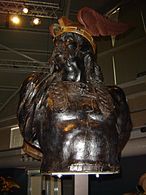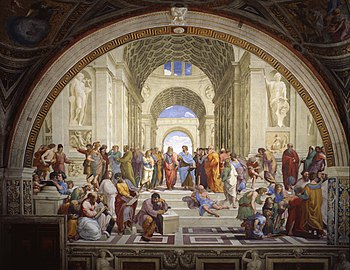387 BC Chr.
Portal history | Portal Biographies | Current events | Annual calendar
◄ |
5th century BC Chr. |
4th century BC Chr. |
3rd century BC Chr. |
►
◄ | 400s BC Chr. | 390 BC Chr. | 380s BC Chr. | 370 BC Chr. |
360 BC Chr. |
►
◄◄ | ◄ | 390 BC Chr. | 389 BC Chr. | 388 BC Chr. | 387 BC Chr. |
386 BC Chr. |
385 BC Chr. |
384 BC Chr. |
► |
►►
| 387 BC Chr. | |
|---|---|
| Senones under Brennus defeat the Romans in the Battle of the Allia . | Legend has it that the sacred geese of Juno save the Capitol in Rome from conquest and sacking. |
| Plato founds the Platonic Academy near Athens . | |
| 387 BC In other calendars | |
| Buddhist calendar | 157/158 (southern Buddhism); 156/157 (alternative calculation according to Buddha's Parinirvana ) |
| Chinese calendar | 38th (39th) cycle , year of the wood-horse甲午 ( at the beginning of the year water-snake 癸巳) |
| Greek calendar | 1./2. Year of the 98th Olympiad |
| Jewish calendar | 3374/75 |
| Roman calendar | from urbe condita CCCLXVII (367) |
Events
Politics and world events
Western Mediterranean
- Lucius Papirius Cursor, Lucius Aemilius Mamercinus, Lucius Valerius Potitus Poplicola, Gnaeus Sergius Fidenas Coxo, Licius Menenius Lanatus and Aulus Manlius Capitolinus become Roman consular tribunes .
- The Etruscan city Clusium is from the Celtic tribe of the Senones under Brennus attacked. The Etruscans call Rome for help. During the negotiations between the Celts and the Roman ambassador Quintus Fabius Ambustus, a leader of the Senones is killed. They then break off the siege of Clusium and turn against Rome.
- July 18th : This ater : About ten kilometers from Rome, the battle of the Allia takes place between the Senones and six Roman legions (around 40,000 men) under Quintus Sulpicius. The Celts succeed here in an overwhelming victory; the Roman phalanx is wiped out, the survivors flee to Veii and Rome. Then the city of Rome - with the exception of the Capitol Hill - is besieged and sacked for seven months. According to legend, the sacred geese of the Juno had warned the citizens of the approaching Senones so that they could hide on the hill.
Eastern Mediterranean
- In the Persian city of Sardis , negotiations begin to end the Corinthian War between Sparta on the one hand and Athens , Argos , Corinth and Thebes on the other. The aim is a general peace that should end the decades-long conflict between the Greek city-states. Finally there is a peace of the king .
- Greek colonists from Sicily found the city of Ancona on the east coast of Italy.
- The island of Samos falls back to the Persians .
Culture and society
- Plato acquires the grove of the mythical hero Akademos , northwest of Athens. Here he begins to give philosophical and scientific lessons. Over time, the name of the grove is also transferred to the school, which is usually referred to as the Platonic Academy .


